Latest
Edo Castro by Brent-Anthony Johnson
Edo Castro’s passion for music in general and the electric bass guitar in specific are undeniable! His latest offering, “Phoenix” was released in 2006, and the rich, textural compositions weave a timeless musical expression! Edo spent many years as a disciplined self-taught bassist before attending Chicago’s American Conservatory of Music where he received a Bachelor of Music degree, in 1987. Since returning to his beloved Berkley, CA he has graced dozens of recordings – often with his 7 and 9-string instruments – and he has graced stages with artists such as Ed Thigpen, Fareed Haque, Pete Cosey, and Roy Haynes! Check out Edo at www.edocastro.com
BAJ: Edo! Thanks for taking a moment to chat with us at Bass Musician Magazine, man! “Phoenix” is a very cool release and I am so glad you sent a copy to us! It is so nice to hear maturity in your fine playing and compositions! Please describe your composing practice and tell us how the music “went to tape”?
EC: Thank you for having me. I’m flattered that you’re enjoying “Phoenix”. This project came together easily compared to my first CD “Edo” which took 7 years. To make a long story short, my first CD took 7 years because I was just making excuses not to finish it. But I did it. Anyway all the ideas that had been percolating from the first CD eventually revealed themselves in the latest recording. I worked on most of the material at home recording to disk on my computer. I’m not much of midi person these days. I like the organic process of real instruments playing one track at a time. Midi has been a great tool for me in the past but it was a sterile process. Even when I use my Conklin Midi bass for recording I’m recording the audio from the GR 33 and not the midi information. Recording Midi data took away the art of playing my instrument and I began to just futz with zeros and ones. Tweaking events and processes that had to do more with the computer than the bass. It just didn’t feel right…
For me composing is a varied path and I don’t approach writing the same way twice. At times it starts off as a bass line, a chord progress or a melodic idea. Sometimes I write it down on manuscript paper and other times I just record the germ seed idea on my loop pedal or in my computer. From there I work out the ideas until I feel I have an organized idea. Sometimes I just have bits and pieces pre-recorded that sit around until I get the inspiration to finish it.
Take for instance “Song of the Electric Whales”. I created this spacious slow loop and recorded it to my computer. Two months later, I watched the movie, The Whale Rider, which gave me the idea to complete the song. I thought to myself “hey I know how to make those whale sounds!” Once I created those whale sounds the melody came easily. I used a volume pedal to give it that underwater feeling.
In the last 10 years I’ve gotten into letting an idea take shape on it’s own with very little pressure from me. I’ve been enjoying “stumbling onto something by accident.” My version of “Amazing Grace” was completely unplanned. I just created another wonderful layered loop. But I had no melody. For months I tried writing a melody. Then one day I started playing this loop and the melody for “Amazing Grace” just came out from my hands. So I just went with that! The alternate lyrics you hear on “Amazing Grace” came 1 year later while I was driving to a gig in Central California. The original concept can be seen on You Tube that I uploaded a year or so ago. (www.youtube.com/watch?v=EchlvnpCUVg) or search Edo bass Loop. It’s the first performance of that tune.
For “Phoenix” I wanted to get into what I refer to as “changing the moment.” I first experienced this when I heard the opening harmonics passage to Pat Metheny’s tune “San Lorenzo”. Those notes (and the arrangement of those notes) made my hair stand on end. Time seemed to stand still as I listened to the music unfold.
This was the first time I really experienced space, melodic intention and a story telling in music outside of vocal music. Prior to hearing this I had only been listening to pop music and the fusion stuff like Return To Forever with Chick, Stanley, Al and Lenny. Don’t get me wrong I think the music of RTF is beautiful, complex and very intense. But I tend to gravitate towards a particular sound or feeling that is much more relaxed and less athletic musically.
“Phoenix” wasn’t meant to be party music but you might play this while eating dinner, sitting late at night or just having it in the background. It’s a veiled complexity. When you first listen to the album you think, “hmmm new age.” But when you dig deeper, there’s a lot of great stuff going on just below the surface.
Take for example the opening Track “Beneath an Evening Sky” by Ralph Towner. This tune has some beautiful rhythmic/harmonic structures. It starts off in 6/4 then in the middle of it goes briefly into 5/4 then back into 6/4. The F# Major 7 +5 chord at the end of the B section is a beautiful turn around to come back to the B Minor to G Major 7 #11 arpeggio. A friend of mine transcribed it around 1986-87 and I figured out how to play the chord voicings on 6 string bass. I had forgotten about that tune until I found the manuscript in my drawer a few years ago. I pulled it out and the song was still under my hand after some 20 years!

EC: Oh I love space. It’s perhaps the most underrated tool in music. After 30 years of playing bass, I’m learning to be more relaxed with space and use it. I think we get nervous when there’s a blank spot and we tend to want to fill the void immediately. There are lots of players like this and I for one have been guilty of this on many occasions! When I started off playing bass I was very impressed with the amount of notes and chords some of my heroes played. I was especially impressed with the speed in which they played these notes.
Perhaps it was the perception of “many notes” and my lack of understanding or experience that led me to believe “many notes” meant great musicality. I usually refer to space as “Breath”. Music is no different from speaking or having a conversation. Between thoughts, there is a moment of silence that we all hang on to, before we hear the next thought. In music, the spaces in-between each note is so minute, so small that a whole note seems to last an eternity. When you use “breath” as part of your solo, it really makes a difference. Anybody can play fast, use a lot of notes and play a lick. But it’s the artist who uses space as part of their melodic language that is going to impress me the most. Again my analogy here is more eloquent, like ballet versus running a race. Sure we can get caught in the excitement of the moment and run with an idea, but I have a tendency to run out of gas if I just play fast out of the gate. It’s much more demanding to build and create a story, rather than blow a bunch of “dig me” licks. So I practice taking my time and building an idea in a solo or bass line.
As far as which bassist has been an influence on me, every bass player that has come before me has been a major influence: Bootsy, Donald Duck Dunn, James Jamerson, Scott LaFaro, Ray Brown, Stu Hamm, Michael Manring and Ron Carter to name a few. But I do have my favorites: Mark Egan, Marcus Miller, Eberhard Weber, Jaco, Jimmy Haslip, Steve Swallow and Anthony Jackson. I tend to favor the electric players because I’m an electric player. My latest favorite is Carles Benevent from Spain. He’s amazing and has his own sound!
My main influences as a composer come from the likes of Jan Garbarek, Vince Mendoza, Charlie Haden, Lyle Mays, Pat Metheny, Ralph Towner, Eberhard Weber and Egberto Gismonte. Steve Khan’s “Eyewitness” recordings with Anthony Jackson have been a big influence on me compositionally. Pianist Bill Evans continues to be an influence on me as a soloist and a composer. I have almost every album that’s been released/re-released before and after his passing. Talk about space… Bill Evans is the king when it comes to playing with space.
BAJ: You have a busy performance and session schedule. What does your average week consist of, musically speaking, and with whom are you playing at this writing?
EC: I’m working with Edgetone Records artist Drummer/Composer Eric “Doc” Smith. He’s playing an Electronic Triggering device called a “Zen Drum.” I’ve been looking for someone like me who’s walked away from the traditional role of the instrument that they play and created another way to express themselves. Eric is the guy I’ve been looking for. He doesn’t play a kit drum much these days and that’s really great. Between my loops, my midi bass and Eric triggering sound, you hear all these sounds coming from 2 musicians. The possibilities are endless between the 2 of us.
Just recently I played with Atlanta GA Guitarist Ronnda Cadell who I met through myspace.com Ronnda drove out from Georgia and just gigged along the way to the West Coast. She’s a wonderful artist and musician to work with. She gave me carte blanche with her songs. At the end of the night she just had this big grin on her face and said, “Thank you for making me sound like Joni Mitchell.” She was referring to Joni’s album “Hejira” with Jaco Pastorius. That was a fine compliment because I spent many hours pouring over all those progressions and arrangements. That’s a beautiful album.

BAJ: Would you tell our readers one of your most important life lessons?
EC: I think the biggest lesson for me has been to appreciate where I am in my life and not focus on where I am not at in my life. I spent a good portion of my life fretting because my life didn’t unfold as I imagined it would. This caused me to overlook the opportunities and possibilities that were right in front of me. Under the surface I was unhappy. Living in the present moment by appreciating the things that you do have brings contentment and joy.
Besides everyone loves being around a happy person.
2) Always be thankful for everything and not overlook the smallest of things. This probably part 2 of lesson 1. You can have all the money in the world, but it would be worthless if you were sick or dying. I believe if you live your life with gratitude, you generally tend to be a happier healthy person. Happiness is contagious and it really changes people around you when you’re happy.
3) Don’t be influenced by what people think of you or your art. Insecurity is our worst enemy. That’s not to say we should be conceited. For me it’s about believing in what you do and holding true to your vision. There are folks out there who would like to undermine your thinking and get you confused. Don’t be afraid of people disliking what you do in your art.
Not everyone is going to get it and that’s OK.
4) Trust your instincts. If you feel something’s not right, you’re probably right.
5) Be true to yourself. We all want to fit in and be cool, hip etc. I think that’s a mistake. Did you ever find times in your life where you did things you didn’t really care for or didn’t want to do but said yes so you could be seen as cool or fit in? That’s being submissive to the will of others. I think when we stop “trying to be something” we begin to take on an authentic self and step away from “the hipness factor.” Everything about us is more genuine. It’s human nature to want to be identified with a group. Yet, each of us wants to be seen as an individual or unique. It’s a crazy paradox for the psyche. My friend and bassist Yves Carbonne and I have this ongoing joke to see who can play the slowest. The point is we’re not trying to sound like Marcus Miller or Jaco nor are we trying to impress anyone by playing the fastest bass line or solos. We are just being ourselves. Besides there can only be one Jaco, or one Marcus Miller. Why be a great imitator?
LIFE, like music, is an evolutionary process… These life lessons I mentioned are things I work on every day. The more I work at them the more applicable they become in my life, just like practicing scale modes, arpeggios and other musical exercises. Again this is just my prospective and there are those who would disagree with me or find these things not applicable to themselves. If anything, I think about this old Chinese proverb I heard years ago, “If you want to know what the road is like up ahead, ask the traveler who is coming in the other direction.”

EC: I think it’s really important to live your life so that you have something to say in your music. It’s quite admirable to practice 8-10 hours a day, (and I used to do that)! But outside your door life passing by, and its time we’ll never get back. Never. So I do everything I can to spend time with friends, my wife and loved ones, and get out and enjoy Nature. Be in the world. Sometimes I just sit and watch the grass grow and that is good too! These days we spend a lot of time on the Internet living in virtual space, traveling in cars, moving quickly and not being still. It’s really good to stop, unplug and touch the real world. I clean the house weekly, water my garden, work out, ride my bike, do yoga, play golf, read books or watch films. Oh yeah I love to cook.
BAJ: Where is life taking you next, Edo?
EC: Ah the eternal question “Quo Vadis?” I do my best to live in the moment, day by day. This doesn’t mean I’m cavalier or that I’m guided by my whimsy or living a life of exuberance and drunkenness. It’s focusing on the tasks at hand and being mindful of the present. If someone is mopping floors to help cover the bills, then enjoy the task. It’s not permanent. Everything is in motion. If you make a mistake, figure it out and let it go. Like music if you hit a wrong note And obsess over it, you’re out of the musical moment and you’re many measures behind. Life is not so different.
I’d like to think that what I do now in the present that is positive, good and thoughtful would guide me to the next place where I should be while on this journey called “Life.” It’s easy to think we are in control of our lives but really we aren’t. We can only raise our sails, catch the prevailing winds and hope for calm seas and good weather. The better we are at adapting to what life gives us with a positive attitude the better our chances of having the things we want in our lives to materialize. I’m a firm believer that whatever we do, good or bad, is not over-looked. Our actions go out into the world like a stone falling into a pond. You never know what your actions will do or whom they will affect so it’s good to always be mindful.
As far as musical endeavors are concerned… I’m on a project called “K2” that was just released on Edgetone records, by Eric “Doc” Smith. I’m also working with a trio project with 2 great local players, Erik Lindquist on Guitar and Alex Aspinall on Drums. I’m also assisting Lisa Star (Passion Star) and Ray Cooper for their Cooper/Star material. Ray Cooper is an Executive Producer and Producer.
Lisa Star is co-writer on this material as well as vocalist. Ray Cooper produced “Phoenix”. I’ve got a live track from my performance opening for Manring, Kassin and Darter that will be on my next CD. The tune is called “It is what it is.” Eric “Doc” Smith is playing the Zen Drum. He had the difficult task of playing to my bass loops and did a brilliant job. I’m planning on going to NAMM 2009 in Anaheim CA. “Doc” Smith and I have been talking about doing some gigs in Europe. We will see. It’s just talk right now.
I also spend time searching for tone or a particular voice in an instrument. I’ve been fortunate to have some of the finest boutique basses made, yet the search for tone continues. Conklin basses continue to be my mainstay instruments providing me with great tone and flexibility. Bill Conklin is the guy that started it all with the multi-stringed bass movement. Bill is finishing up a bass for me as I type this. So I look forward to that. Last year I was given an opportunity to help co-design a bass with bass maker Fred Bolton of Bee Basses. The result is the “Stinger Bee”. That bass has the best organic sounding Fretless bass I’ve ever heard. I think it’s the combination of the acrylic saturated fingerboard and graphite neck that gives the bass its horn like qualities. The fingerboard feels like wood so the result is more “woody” in nature yet resilient to string wear. I hope to see a few more basses in my future. I’ve been very fortunate and blessed to have good life. I wish the same for you and your readers as well, Thank you.
Visit online at www.edocastro.com
Bass Videos
Interview With Bassist Erick “Jesus” Coomes
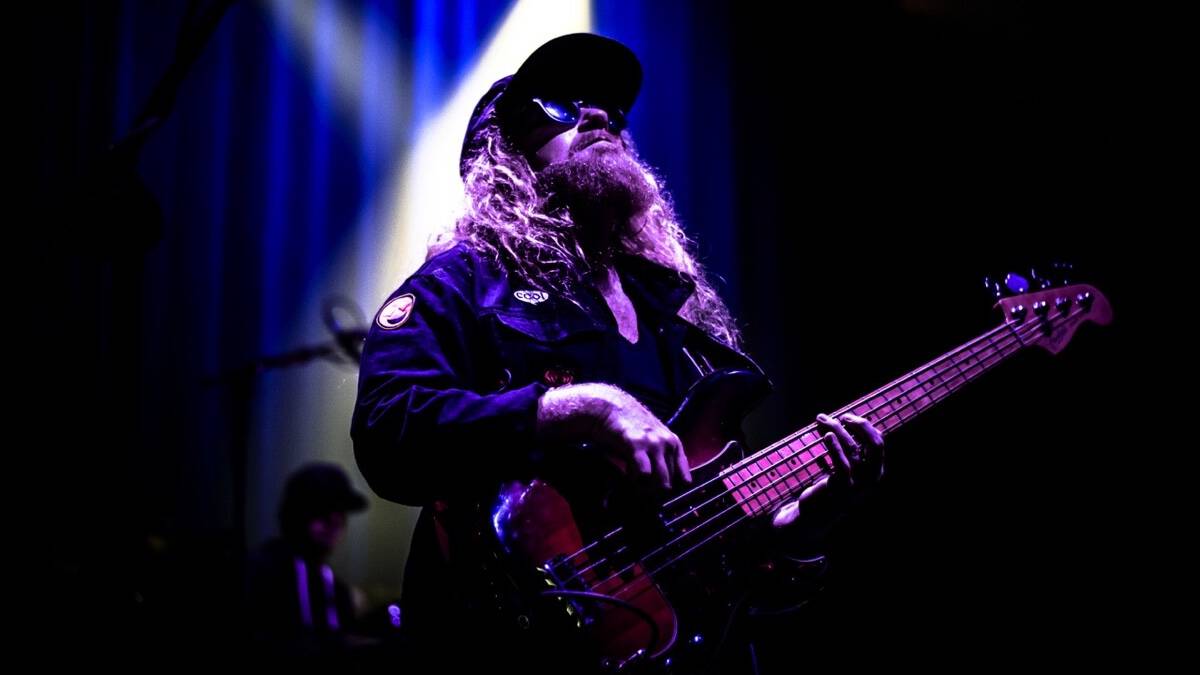
Bassist Erick “Jesus” Coomes…
It is always great to meet a super busy bassist who simply exudes a love for music and his instrument. Erick “Jesus” Coomes fits this description exactly. Hailing from Southern California, “Jesus” co-founded and plays bass for Lettuce and has found his groove playing with numerous other musicians.
Join us as we hear of his musical journey, how he gets his sound, his ongoing projects, and his plans for the future.
Photo, Bob Forte
Featured Videos
Visit Online
www.lettucefunk.com
IG @jesuscsuperstar
FB@jesuscoomes
FB @lettucefunk
Bass Videos
Working-Class Zeros: Episode #2 – Financial Elements of Working Musicians
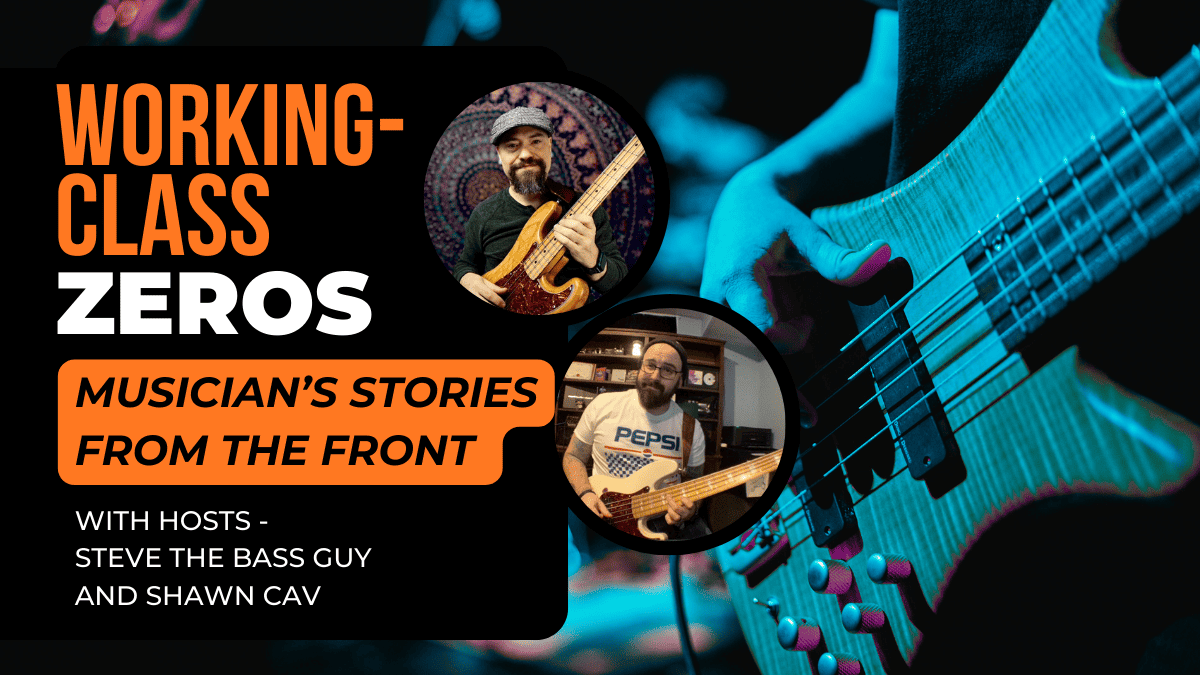
Working-Class Zeros: Episode #2 – Financial Elements of Working Musicians
“These stories from the front are with real-life, day-to-day musicians who deal with work life and gigging and how they make it work out. Each month, topics may include… the kind of gigs you get, the money, dealing with less-than-ideal rooms, as well as the gear you need to get the job done… and the list goes on from there.” – Steve the Bass Guy and Shawn Cav
Latest
This Week’s Top 10 Basses on Instagram
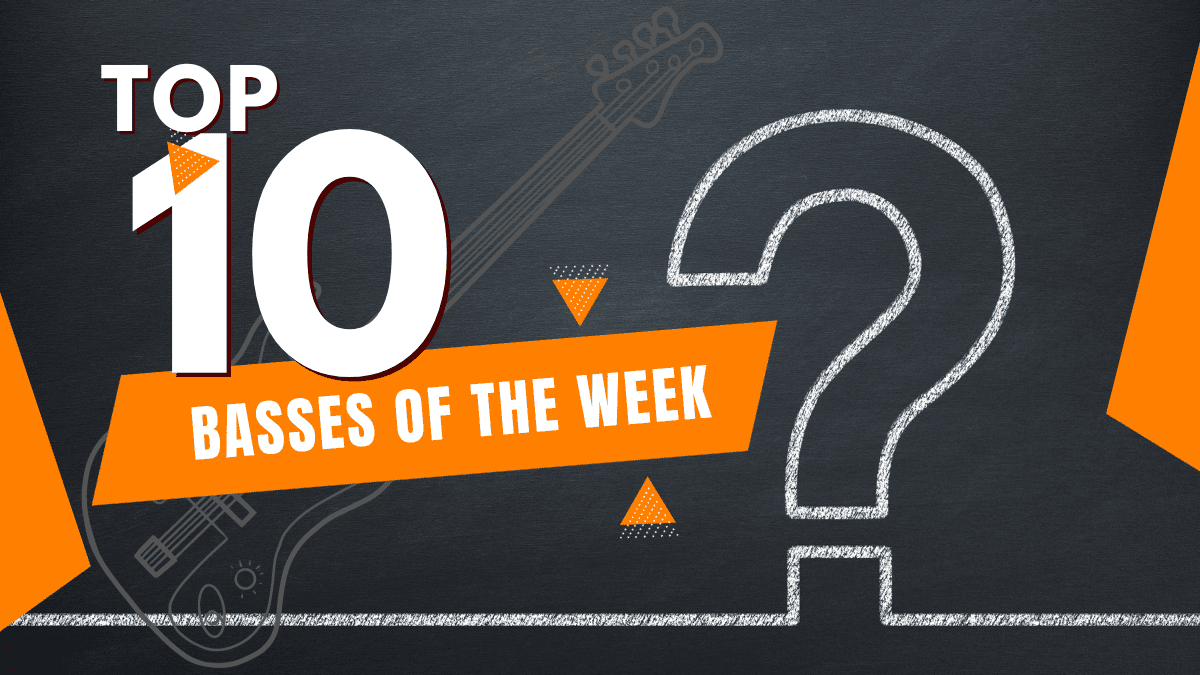
Check out our top 10 favorite basses on Instagram this week…
Click to follow Bass Musician on Instagram @bassmusicianmag
FEATURED @foderaguitars @overwaterbasses @mgbassguitars @bqwbassguitar @marleaux_bassguitars @sugi_guitars @mikelullcustomguitars @ramabass.ok @chris_seldon_guitars @gullone.bajos
Bass CDs
New Album: Jake Leckie, Planter of Seeds
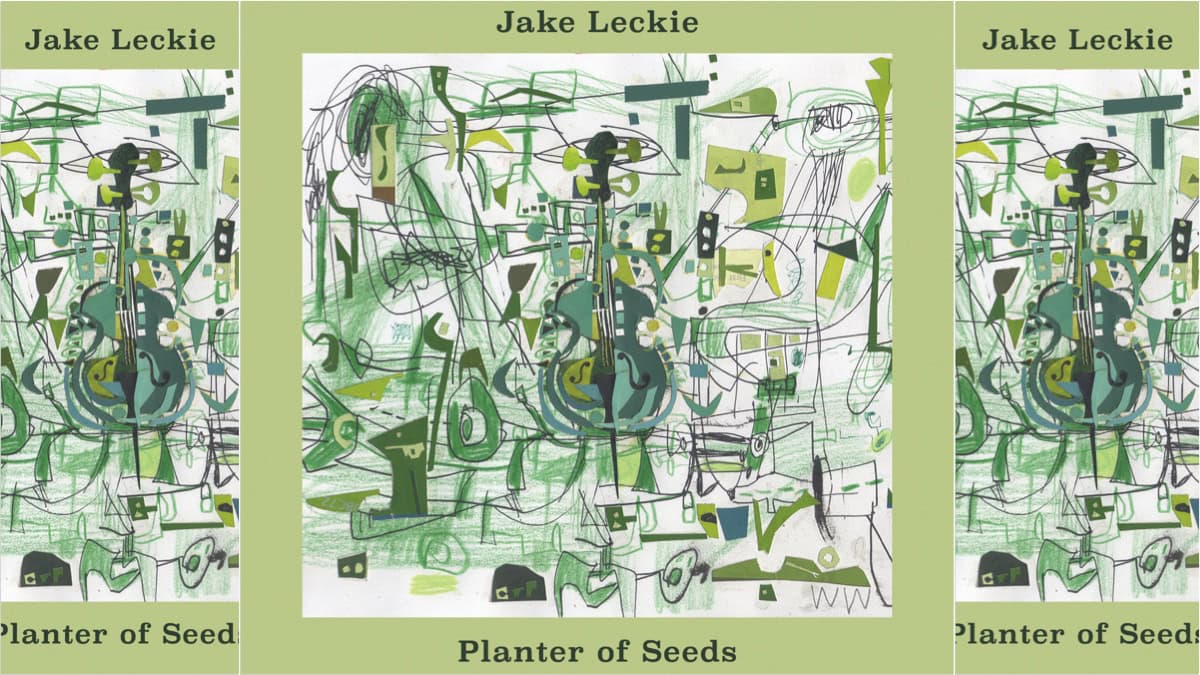
Bassist Jake Leckie and The Guide Trio Unveil New Album Planter of Seeds,
to be released on June 7, 2024
Planter of Seeds is bassist/composer Jake Leckie’s third release as a bandleader and explores what beauty can come tomorrow from the seeds we plant today.
What are we putting in the ground? What are we building? What is the village we want to bring our children up in? At the core of the ensemble is The Guide Trio, his working band with guitarist Nadav Peled and drummer Beth Goodfellow, who played on Leckie’s second album, The Guide, a rootsy funky acoustic analog folk-jazz recording released on Ropeadope records in 2022. For Planter of Seeds, the ensemble is augmented by Cathlene Pineda (piano), Randal Fisher (tenor saxophone), and Darius Christian (trombone), who infuse freedom and soul into the already tightly established ensemble.
Eight original compositions were pristinely recorded live off the floor of Studio 3 at East West Studios in Hollywood CA, and mastered by A.T. Michael MacDonald. The cover art is by internationally acclaimed visual artist Wayne White. Whereas his previous work has been compared to Charles Mingus, and Keith Jarrett’s American Quartet with Charlie Haden, Leckie’s new collection sits comfortably between the funky odd time signatures of the Dave Holland Quintet and the modern folk-jazz of the Brian Blade Fellowship Band with a respectful nod towards the late 1950s classic recordings of Ahmad Jamal and Miles Davis.
The title track, “Planter of Seeds,” is dedicated to a close family friend, who was originally from Trinidad, and whenever she visited family or friends at their homes, without anyone knowing, she would plant seeds she kept in her pocket in their gardens, so the next season beautiful flowers would pop up. It was a small altruistic anonymous act of kindness that brought just a little more beauty into the world. The rhythm is a tribute to Ahmad Jamal, who we also lost around the same time, and whose theme song Poinciana is about a tree from the Caribbean.
“Big Sur Jade” was written on a trip Leckie took with his wife to Big Sur, CA, and is a celebration of his family and community. This swinging 5/4 blues opens with an unaccompanied bass solo, and gives an opportunity for each of the musicians to share their improvisational voices. “Clear Skies” is a cathartic up-tempo release of collective creative energies in fiery improvisational freedom. “The Aquatic Uncle” features Randal Fisher’s saxophone and is named after an Italo Calvino short story which contemplates if one can embrace the new ways while being in tune with tradition. In ancient times, before a rudder, the Starboard side of the ship was where it was steered from with a steering oar. In this meditative quartet performance, the bass is like the steering oar of the ensemble: it can control the direction of the music, and when things begin to unravel or become unhinged, a simple pedal note keeps everything grounded.
The two trio tunes on the album are proof that the establishment of his consistent working band The Guide Trio has been a fruitful collaboration. “Santa Teresa”, a bouncy samba-blues in ? time, embodies the winding streets and stairways of the bohemian neighborhood in Rio de Janeiro it is named for. The swampy drum feel on “String Song” pays homage to Levon Helm of The Band, a group where you can’t always tell who wrote the song or who the bandleader is, proving that the sum is greater than the individual parts. Early jazz reflected egalitarianism in collective improvisation, and this group dynamic is an expression of that kind of inclusivity and democracy.
“The Daughters of the Moon” rounds out the album, putting book ends on the naturalist themes. This composition is named after magical surrealist Italo Calvino’s short story about consumerism, in which a mythical modern society that values only buying shiny new things throws away the moon like it is a piece of garbage and the daughters of the moon save it and resurrect it. It’s an eco-feminist take on how women are going to save the world. Pineda’s piano outro is a hauntingly beautiful lunar voyage, blinding us with love. Leckie dedicates this song to his daughter: “My hope is that my daughter becomes a daughter of the moon, helping to make the world a more beautiful and verdant place to live.”
Bass CDs
Debut Album: Nate Sabat, Bass Fiddler
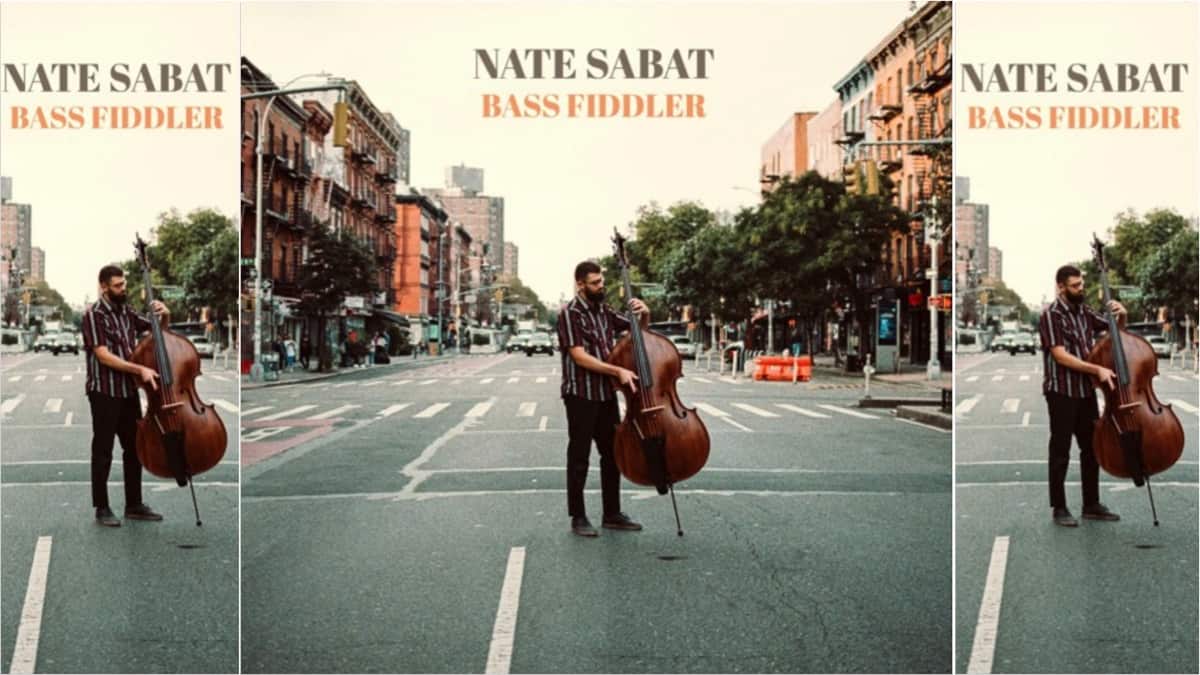
In a thrilling solo debut, bassist Nate Sabat combines instrumental virtuosity with a songwriter’s heart on Bass Fiddler…
The upright bass and the human voice. Two essential musical instruments, one with roots in 15th century Europe, the other as old as humanity itself.
On Bass Fiddler (Adhyâropa Records ÂR00057), the debut album from Brooklyn-based singer-songwriter and bass virtuoso Nate Sabat, the scope is narrowed down a bit. Drawing from the rich and thriving tradition of American folk music, Sabat delivers expertly crafted original songs and choice covers with the upright bass as his lone tool for accompaniment.
The concept was born a decade ago when Sabat began studying with the legendary old-time fiddler Bruce Molsky at Berklee College of Music. “One of Bruce’s specialties is singing and playing fiddle at the same time. The second I heard it I was hooked,” recalls Sabat. “I thought, how can I do this on the bass?” From there, he was off to the races, arranging original and traditional material with Molsky as his guide. “Fast forward to 2020, and I — like so many other musicians — was thinking of how to best spend my time. I sat down with the goal of writing some new songs and arranging some new covers, and an entire record came out.” When the time came to make the album, it was evident that Molsky would be the ideal producer. Sabat asked him if he’d be interested, and luckily he was. “What an inspiration to work with an artist like Nate,” says Molsky. “Right at the beginning, he came to this project with a strong, personal and unique vision. Plus he had the guts to try for a complete and compelling cycle of music with nothing but a bass and a voice. You’ll hear right away that it’s engaging, sometimes serious, sometimes fun, and beautifully thought out from top to bottom.”
While this record is, at its core, a folk music album, Sabat uses the term broadly. Some tracks lean more rock (‘In the Shade’), some more pop (‘White Marble’, ‘Rabid Thoughts’), some more jazz (‘Fade Away’), but the setting ties them all together. “There’s something inherently folksy about a musician singing songs with their instrument, no matter the influences behind the compositions themselves,” Sabat notes. To be sure, there are plenty of folk songs (‘Louise’ ‘Sometimes’, ‘Eli’) and fiddling (‘Year of the Ox’) to be had here — the folk music fan won’t go hungry. There’s a healthy dose of bluegrass too (‘Orphan Annie’, ‘Lonesome Night’), clean and simple, the way Mr. Bill Monroe intended.
All in all, this album shines a light on an instrument that often goes overlooked in the folk music world, enveloping the listener in its myriad sounds, textures, and colors. “There’s nothing I love more than playing the upright bass,” exclaims Sabat. “My hope is that listeners take the time to sit with this album front to back — I want them to take in the full scope of the work. I have a feeling they’ll hear something they haven’t heard before.”
Available online at natesabat.bandcamp.com/album/walking-away



















